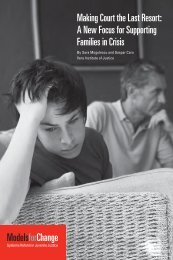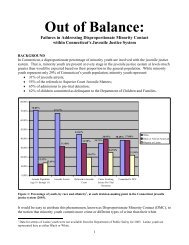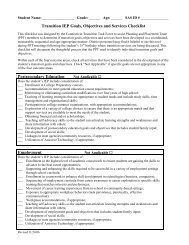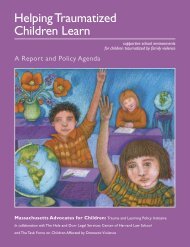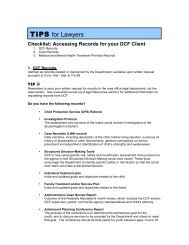2010 Annual Report.indd - Center for Children's Advocacy
2010 Annual Report.indd - Center for Children's Advocacy
2010 Annual Report.indd - Center for Children's Advocacy
Create successful ePaper yourself
Turn your PDF publications into a flip-book with our unique Google optimized e-Paper software.
Our legal advocacy has helped children and youth throughout the state . . .<br />
through legislation . . .<br />
Homeless Youth Act Passed<br />
CCA wrote and advocated <strong>for</strong> new legislation<br />
which requires DCF to coordinate<br />
services <strong>for</strong> homeless youth and contract<br />
with providers <strong>for</strong> outreach, emergency<br />
shelter and transitional living services.<br />
The Connecticut Legislature appropriated<br />
$1,000,000 to fund the new Act.<br />
Education Stability Act Passed<br />
CCA led an ef<strong>for</strong>t to pass groundbreaking<br />
legislation that ensures that abused and<br />
neglected children who are removed from<br />
their homes by DCF and placed in another<br />
town can remain in their home schools.<br />
The Education Stability Act helps foster<br />
children maintain stability and critical ties<br />
with teachers, counselors, mentors and<br />
friends. This is one of the most comprehensive<br />
education entitlement acts in the country<br />
and places Connecticut in the <strong>for</strong>efront<br />
of the movement to provide educational<br />
stability <strong>for</strong> youth in foster care.<br />
through systemic litigation . . .<br />
CCA represented students at Hart<strong>for</strong>d<br />
Public Schools’ 2550 Main Street Academy,<br />
the city’s school <strong>for</strong> middle school and<br />
high school students with special education<br />
needs. After lengthy observation,<br />
CCA’s education consultant and attorneys<br />
concluded that Hart<strong>for</strong>d students were being<br />
denied the appropriate education they<br />
are entitled to by law. CCA filed a class<br />
administrative complaint with the State<br />
Department of Education (SDE) in January<br />
<strong>2010</strong>. SDE shut down the facility and<br />
instructed Hart<strong>for</strong>d to redesign and relocate<br />
the special education program.<br />
through administrative advocacy . . .<br />
CCA’s collaboration reduced the<br />
numbers of children in SAFE Homes –<br />
congregate care emergency shelters <strong>for</strong><br />
abused and neglected children in the care<br />
of DCF. Clinical research of congregate<br />
care settings <strong>for</strong> children shows that these<br />
settings are inappropriate and produce<br />
poor outcomes <strong>for</strong> children. When DCF<br />
issued a Request <strong>for</strong> Proposals (RFP)<br />
stating its intention to fund SAFE homes <strong>for</strong><br />
children under six, CCA was among those<br />
who wrote to the Commissioner of DCF<br />
advocating against these homes.<br />
DCF rescinded the RFP.<br />
through task <strong>for</strong>ce leadership . . .<br />
CCA co-chaired the Connecticut Legislature’s<br />
Families with Service Needs<br />
(FWSN) Advisory Board until the Board’s<br />
tenure ended in June. CCA submitted<br />
testimony to support creation of three<br />
additional Family Support <strong>Center</strong>s and<br />
expanded services to FWSN youth in six<br />
Juvenile Risk Reduction <strong>Center</strong>s. In March,<br />
<strong>2010</strong>, The Justice Research <strong>Center</strong> of<br />
Florida published an evaluation of the new<br />
FWSN system that found that “substantive<br />
system changes have occurred in Connecticut<br />
that have improved outcomes”<br />
<strong>for</strong> status offenders. Connecticut’s FWSN<br />
Re<strong>for</strong>m was “accepted as a Best Practice”<br />
by the U.S. Department of Justice’s Offi<br />
ce of Juvenile Justice and Delinquency<br />
Prevention <strong>for</strong> their Deinstitutionalization of<br />
Status Offenders initiative.<br />
CCA continued to co-chair the Juvenile<br />
Access Pilot Program Advisory Board,<br />
created after passage of CCA-driven<br />
legislation that opens the juvenile courts<br />
to the public. The new legislation went into<br />
effect February 17, <strong>2010</strong>, and the Advisory<br />
Board is overseeing a pilot program that<br />
allows members of the public and the press<br />
to attend previously closed proceedings.<br />
CCA held a statewide <strong>for</strong>um to educate<br />
attorneys, child protection staff and court<br />
personnel about the pilot project and the<br />
purpose of the Open Courts legislation.<br />
through education and training . . .<br />
CCA’s KidsCounsel Project improves<br />
the quality of legal representation of<br />
vulnerable children by court-appointed<br />
attorneys. Educational resources include<br />
multi-disciplinary trainings held in Hart<strong>for</strong>d,<br />
Bridgeport and Stam<strong>for</strong>d that offer expert<br />
discussion of substantive and procedural<br />
aspects of juvenile law practice; KidsCounsel<br />
newsletters with articles on legal issues,<br />
case law updates, and practical advice <strong>for</strong><br />
attorneys; ListServ; website (www.kidscounsel.org);<br />
state-mandated pre-service<br />
trainings <strong>for</strong> new attorneys who represent<br />
children and families in child protection<br />
cases; and a mentoring program <strong>for</strong> inexperienced<br />
child protection attorneys.<br />
KidsCounsel’s community education<br />
programs provided training and materials<br />
to medical, education and child welfare<br />
professionals and parents about the<br />
legal rights of children, including sessions<br />
<strong>for</strong> health care practitioners; residency<br />
training programs; Juvenile Probation Offi<br />
cers; and training <strong>for</strong> parents of special<br />
needs children.<br />
Legal right trainings <strong>for</strong> youth were held<br />
at shelters and group homes throughout<br />
the state to help youth become good<br />
advocates <strong>for</strong> themselves. Accessing<br />
support services is key to the education,<br />
health and future of Connecticut’s most<br />
vulnerable children.<br />
New publications, including the fourth<br />
edition of Adolescent Health Care: Legal<br />
Rights of Teens, are available at www.<br />
kidscounsel.org/publications.<br />
CCA contributed a chapter entitled<br />
“Accessing Intervention Services <strong>for</strong><br />
Status Offenders and Avoiding Deeper<br />
Involvement in the Court System” <strong>for</strong><br />
the American Bar Association publication<br />
Representing Juvenile Status Offenders.



